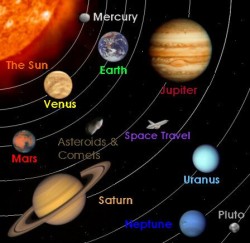 This post is the fourth in our series of confusing words. I hope you are enjoying the series and that it is clearing up some word problems for you!
This post is the fourth in our series of confusing words. I hope you are enjoying the series and that it is clearing up some word problems for you!
Here are this week’s ten problematic words/word pairs:
1. Earth/earth: Does earth begin with a capital E? Usually it does not. The only time you begin earth with a capital E is when you are using it in the same sentence or context with other heavenly bodies that are capitalized. The names of the other planets are capitalized, but the sun and the moon are not. Examples:
Recycling is just one of the ways in which we can take care of the earth. Both Jupiter and Saturn are larger than Earth.2. Emigrate/Immigrate: Emigrate has the prefix -e, which means out. So to emigrate means to leave a country. To immigrate is to go to a country.
They emigrated from Russia to the United States. They left Russia and immigrated to the United States.3. Eminent/Imminent: These two words are completely unrelated. Eminent means well-known or renowned in one’s field. Imminent means about to happen.
Dr. Ray is an eminent scientist in the field of cosmology. Looking at the dark sky, I would say a storm is imminent.4. Everyone/Every one: Sometimes everyone is one word; other times it is two. It depends on how you are using it. When it should be two words, you will probably find yourself pausing slightly.
Everyone on the list is coming to the party. (meaning everybody) Every one of the cakes arrived safely at the party. (meaning every single one of them)5. Fewer/Less: This pair of words is really not that confusing. Use fewer with plurals, and use less with singulars or things that cannot be counted.
There are fewer cookies on this plate than on the other one. There is less cake on this plate.6. Firstly, Secondly, Thirdly, Lastly: As transition words, use first, second, third, and last instead of adding the -ly at the end. And please don’t use first off!
First, add sugar. Second, add butter. Third, cream them together. Last, add the flour.7. Formally/Formerly: Formally involves tuxedos and gowns and is from the word formal. Formerly is what happened before, from the word former.
You need to dress formally for the wedding. Jane Smith was formerly known as Jane Mills before she got married.8. Former/Latter: If you have mentioned two things, the former is the first one you mentioned, and the latter is the second.
I have two dogs, a chihuahua and a Great Dane. The former is named Tiny, and the latter is named Big Boy.9. Farther/Further: Farther has to do with distance. Further means any more.
I live farther away from the college than you do. I cannot talk about this any further today.10. Good/well: Good is an adjective; well is an adverb. Adjectives are used to describe nouns, usually. Adverbs are used to describe action verbs, usually. Adjectives, however, are used after linking verbs (for example, the verb to be, look, taste, feel, etc.). Note that even though it is an adverb, well can be used after the to be verb to indicate a state of health. (See example below.)
He plays tennis well. I did well on the test. I feel good today. That cake looks good. I feel well.



Sorry but I think you’re wrong about Earth. Earth is capitalized if you’re talking about our home planet, just as we cap cities, countries, etc. Please, let’s show proper respect.
If earth is not capitalized, you’re talking about dirt.
A simple distinction that needs to be maintained.
Different sources say different things. Another source says Earth is capitalized when talking about the planet IF there is no article before it (the earth). Sun and Moon are capped if they are referring to the specific part of our solar system. They can have an article before them. So says the Chicago Manual. Nothing wrong with dirt: I am showing respect.
Arlene, as you know, I love your columns.
The mixed words that I see most often are “less” and “fewer.” It really blows my mind when I see “less” used in newspaper articles and by authors who should know better. Don’t these people have editors, for goodness sake? Thanks as always for the column.
Pete, from now on I will try to use penultimate wherever (or is that whenever?) possible.
Hi Susan – Thanks for the comment. Good luck with using penultimate…I think I’ll pass!! I did have a comment on one of my Linked In groups that there is no distinction between less and fewer, but I disagree. All sources say there is a distinction.
8. Former/latter. Need to add: Penultimate (means 2nd to last).
I have two dogs, and the latter is named Big Boy. The penultimate is named Tiny. (Well this isn’t a very good usage … but I’ve seen letters that referred to the penultimate paragraph, as in: P.S. please see the penultimate paragraph for contact information.
Recently I’ve run across a couple of bad usages of the (correct) word “moot.” Several times I’ve seen people write the assertion, “your argument is mute.” (Mute means “silent.”) The term moot is usually used to mean “pointless” … students in law school often practice in “moot courts” (these are “practice” courts, where the student-lawyers make their cases but the whole exercise is only an exercise).
Thanks for the insightful comments — as always, Pete! Yes, I know mute is often used for moot, so I will perhaps add them to my list. I have never used penultimate, I must admit.